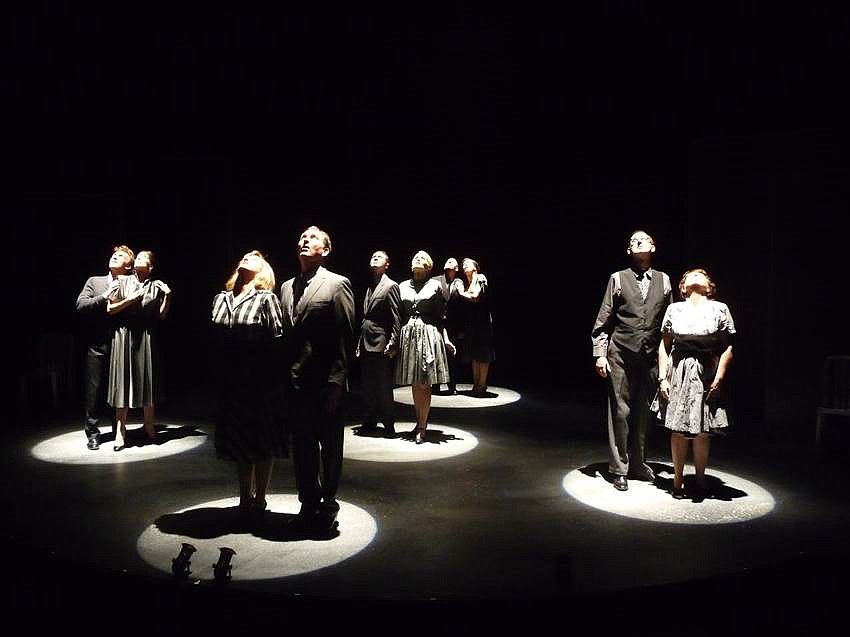- November 24, 2024
-
-
Loading

Loading

This year marks the ninth installment of the Sarasota Improv Festival at Florida Studio Theatre. Starting Thursday, July 14, improv troupes from around the nation will create musicals out of thin air, spout pseudo-Shakespearean soliloquies and bend over backwards to make the daily news sound even more ludicrous than it is.
Their onstage antics might look like anarchy in action. They’re really the result of careful planning.
Rebecca Hopkins is FST’s festival producer — and the woman with the plan. She has an easygoing manner, a musical Southern accent and a fiercely organized mind. A week before the festival, her desk was covered with mysterious papers. Outside her office windows, the place was buzzing. Nobody’s frantic. But nobody’s wasting time, either. The clock was ticking, after all.
The improv festival was Hopkins’ brainchild from the start. For the first eight years, all the prep work was on her shoulders. Starting this year, Will Luera, FST’s director of improv, helps carry the load. It’s still a lot to carry. According to Hopkins, the three-day festival breaks that down to 27 performances and 14 workshops by 90 comedians from 20 improv troupes on five stages. Based on last year’s attendance, it will draw more than 3,000 comedy fans, many from out of town.
“That’s a lot of moving parts, she says. “They don’t come together by accident.”
When does planning for a new festival start?
“Right after the last festival ends,” says Hopkins. “The very next day, we do a post-mortem of what worked and what didn’t.”
At this stage, it’s all informal. The festival chats with the out-of-town performers and looks at the national festival scene to get an idea of the trends. Then, around December, they finalize the roster of performers and their acts.
Hopkins and Luera call up the different troupes and ask what they have in mind to see if it’s a proper fit for the FST improv crowd.
It’s a general audience. According to Hopkins, this is one thing that sets the Sarasota Improv Festival apart.
“A lot of improv festivals are more like improv conventions,” she says. “The improvisers onstage play to improvisers in the seats. We play to an audience of regular people. It keeps it real.”
According to Hopkins, the improv festival has become a victim of its own success. In the early years, audiences put up with a few acts that bombed. Not anymore.
“We spoiled them,” she says. “Now they expect it to be all good, all the time. We have to stick with the A-team improv companies, and make sure they’re on their A-game.”
That’s the plan, anyway. But improv performers still get sick and have family crises. Headliners occasionally drop out and send second-tier performers in their place. Even the greats have bad nights. It’s improv.
But it’s going to be great if Hopkins and Luera can help it.
After lining up the troupes and getting a breakdown of their acts, they finalize the order of performance. Who goes on when and where? Where does each act fit in? It’s not as easy as saving the R-rated material for last.
“We try to mix up the style and pace and keep the audience surprised,” Hopkins says. “If it’s one musical spoof after another, people get bored. If every act is fast and furious, you’ll wear them out.”
And that’s just the creative preparation. Most of the festival planning boils down to unsexy, meat-and-potatoes logistics. Dull, unfunny details, like flying the performers in, putting them up, feeding them, and getting them to the stage on time. Or creating a marketing plan, and shepherding the flyers, ads and videos that come with it — which means getting the improv troupe logos and the names and bios of procrastinating performers. Small stuff, like getting the names spelled right on the festival T-shirts. Big stuff, like finding sponsors.
It’s a lot to think about.
“Yeah, it’s kind of like herding cats.” She laughs. “I happen to be good at herding cats, but there’s just so much that’s humanly possible. Will’s been a life saver. He’s good cat herder, too.”
“I’ve been to all eight festivals as a performer, a teacher and now a producer,” says Luera. “It’s one of the best improv festivals in the world. Helping to make it happen has been a dream come true. It doesn’t even feel like work.”
But, of course, it is.
To increase the level of difficulty, FST’s summertime productions don’t shut down while the festival’s under way. The shows go on. The business office still opens its doors on Monday morning. The staff still goes to work.
Hopkins makes sure they can keep their eyes open.
“The festival adds up to 72 hours of performance,” she says. “The staff would love to be here for all of it, but they’d be useless for the next week. I don’t want to overwork anybody. Accidents happen when you’re burned out and tired.”
What’s next? A 10-day festival? Five-thousand people in the audience? More?
“That’s not my ambition,” she says. “I think we’re just about the right size the way we are. I know the performers’ names and faces; they know me; the audience feels the same intimacy. We don’t want to get bigger and bigger. We want to get better and better.”